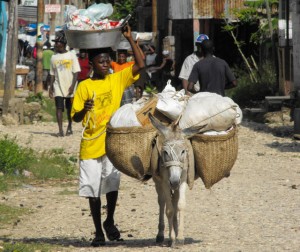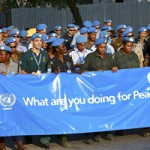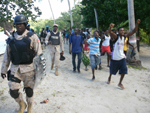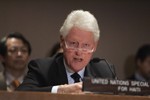Haiti as a Testament to Human Resistance
By Kim Ives
Haiti Chery
Review of Dady Chery’s book, We Have Dared to Be Free: Haiti’s Struggle Against Occupation, and discussions of this work with Dr. Chery on WBAI 99.5 FM’s radio program, Lanbi Call.
Every definable chapter of recent Haitian history seems to have one book that becomes the definitive reference for English speakers. Amy Wilentz’s The Rainy Season, 1986-1989; Peter Hallward’s Damming the Flood, 2000-2006; and Jonathan Katz’s The Big Truck That Went By, years around the 2010 earthquake, come to mind.
All of those examples, however, were written by foreigners. For the period of the rise and fall of President Michel Martelly, roughly 2010 to 2015, the definitive account at this point is surely We Have Dared to be Free: Haiti’s Struggle Against Occupation (News Junkie Post Press, 2015), written by Haitian scientist turned journalist Dady Chery.
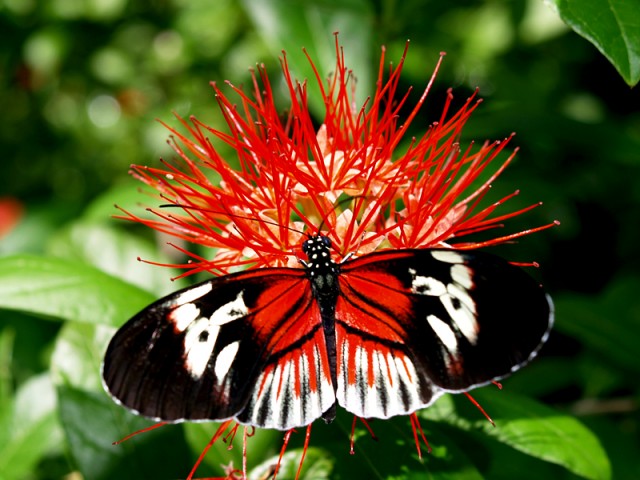
The book is much more than a recapitulation and analysis of government malfeasance and popular resistance during the years of the recently departed Martelly regime. It is a stirring and unflinching indictment of world capitalism, presented through the prism of the Haitian history, traditions, and culture. It leaps from macro to micro and back, through a patchwork of personal reminiscences, interviews, scientific explanations, and historical accounts which illuminate, not just Haiti, but the state of the world today.
“We can visualize a world where Haiti’s revolution has expanded to all of humanity and become a final push for the birth of all humans into their full potential, and more than anything, into a respect for the other that borders on a religion, with the understanding that we are part of all the life that makes up this era on Earth,” Chery writes in a tour-de-force introduction. “Haiti’s example of the first successful anti-capitalist, anti-imperial, and anti-colonial revolution in a world where slavery was in vogue, showed what humans could do in the face of impossible odds.”
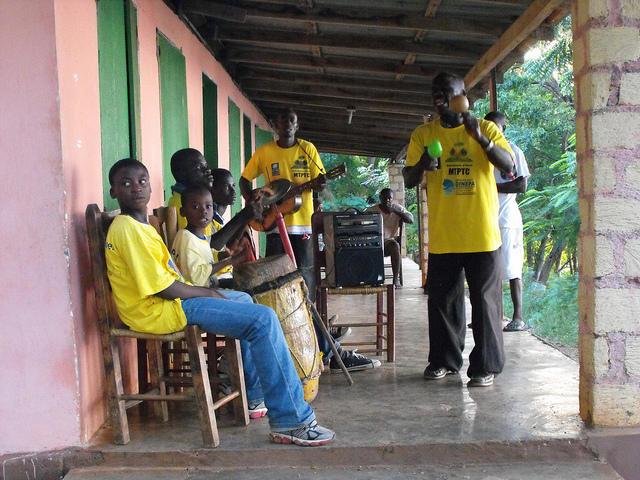
Throughout the book, the author, proud of her “magical childhood” in the Haitian countryside, argues that, in many ways, Haiti offers a model of how the human race can survive in the face of the ecological and economic tsunamis on the horizon. “In addition to a categorical rejection of racism, at the base of all Haitian conduct was also a rejection of slavery: the philosophy that one does not live to work, but one works to earn enough to celebrate life by developing one’s talents,” she writes. “Such an idea is contrary to the capitalist notion of ever growing consumption that follows the failing model of endless economic growth.”
As the title suggests, the author carefully catalogues the crimes of the on-going 12 year United Nations military occupation known as the UN Mission to Stabilize Haiti, or MINUSTAH, including “gunrunning, trading food for sex, cholera contamination, human trafficking, child prostitution, rape, murders, and massacres.”
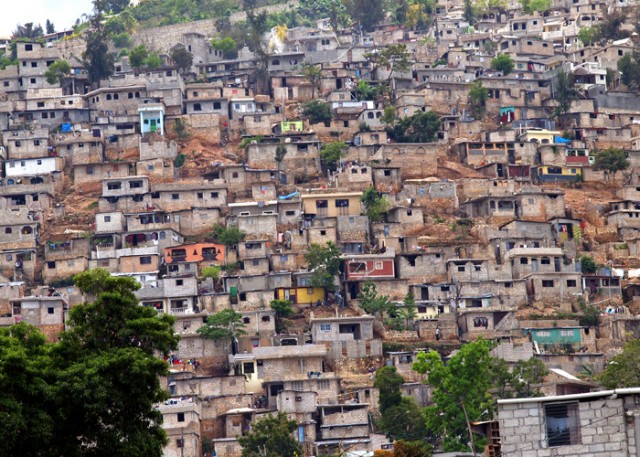
She also lays out the role of the Clintons, particularly Bill Clinton as the co-chair of the Interim Haiti Recovery Commission (IHRC). “From the start, Bill Clinton’s IHRC, an international group of wealthy businessmen, backed by an expanded army from MINUSTAH, forced themselves on the country to make it liquidate its commons to them and their friends at fire-sale prices,” Chery writes. She details the popular resistance to the IHRC and an associated State of Emergency Law “which allowed a takeover of Haiti’s reconstruction efforts formally for 18 months in principle, but really for as long as possible, by a group of wealthy foreign donors who would operate without any liability for their actions.”
Chery is a college biology professor in the United States, and throughout We Have Dared to Be Free there are detailed scientific presentations on a host of matters: climate change, Haiti’s cholera epidemic and its solution (sanitation, not vaccines), the kidnapping of Haiti’s endangered wildlife species, gold mining, etc.
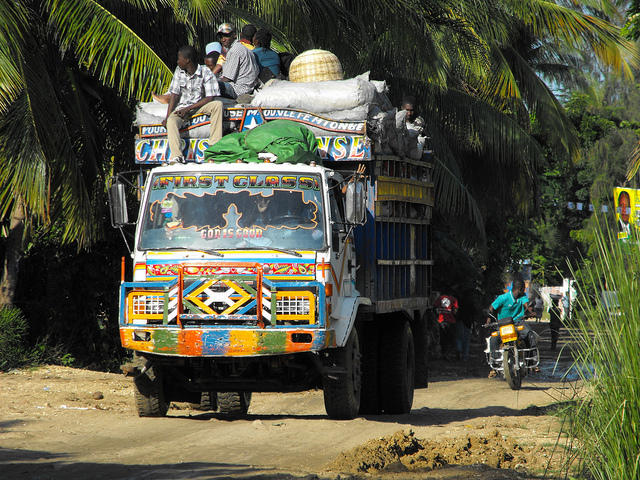
The structure of the book is unconventional. Rather than the customary recitation of Haitian history at the book’s beginning, Chery places her detailed treatment of key episodes in Haiti’s story towards the middle and the end. Chapter 11 gives an in-depth explanation of rebel leader Charlemagne Péralte and the Caco guerillas who fought the 1915-1934 U.S. Marine occupation of Haiti, and Chapter 21 (of 23 total) gives a similarly detailed account and analysis of Toussaint L’Ouverture, the leader of the successful slave revolution in the colony of St. Domingue.
Chery also slaughters many sacred cows. I particularly liked her spirited defense of the institution of restavek, which is often presented by North American liberals as child slavery. “One cannot talk about orphaned Haitian children without confronting two highly controversial and interwoven subjects: Vodou and restavek,” Chery writes. “Both are part of the very fabric of the Haitian family, which is currently under vicious attack.”
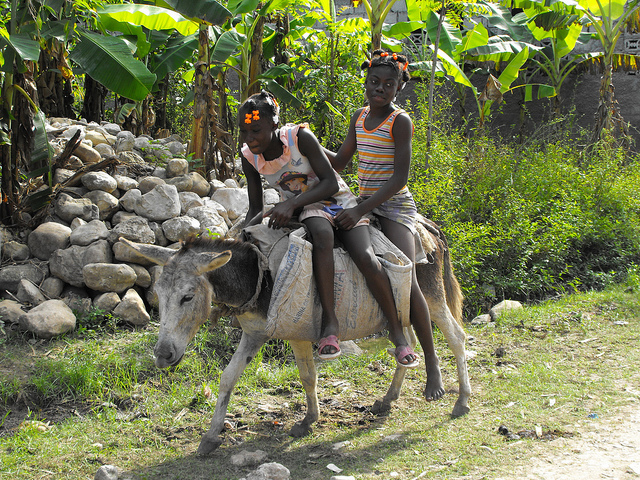
Chery’s mother had been a restavek in her grandparents’ home, and she relates many anecdotes to argue that the “restavek system is profoundly subversive in that it intimately binds Haitians of different socioeconomic classes.”
Similarly, the author makes a clear explanation and strong defense of Vodou: “The practices of Haitian Vodou represent religion, unadulterated, unappropriated, and at its best: not an infantilizing force that habituates people to their prostration before a greater power, but a cultural force that anchors people in the lands and waters around them and furnishes them with the practices for a joyful, sustainable life.”
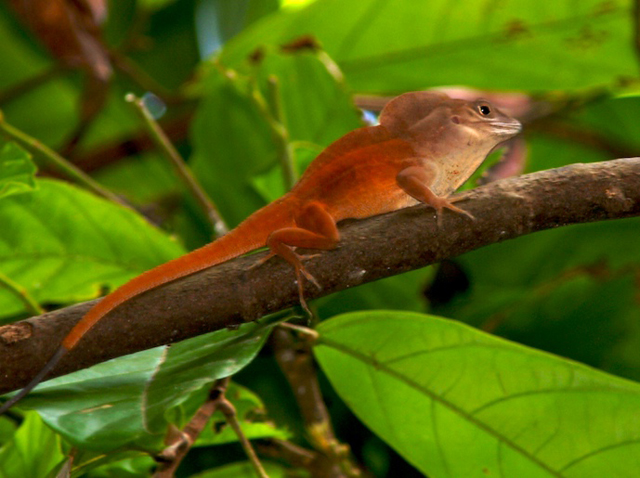
Many parts of the book are drawn from the author’s Haiti Chery blog (www.dadychery.org), such as her detailed review of the Martelly government’s unilateral attempts to transform the bucolic Ile à Vache (Cow Island), just off Aux Cayes, into a tourist complex, without consulting with the island’s population. The author interviewed the leaders of the resistance that emerged and explains why and how the takeover foundered.
Chery takes to task some progressive U.S. journalists and intellectuals, charging them with being “high priests of journalism” who “promote the neoliberal agenda and encapsulate their disinformation in reasonable seeming and progressive-sounding language.” In her zeal to defend Haiti against the undeniable “propaganda war” and “disinformation campaign” waged against it, Chery may be blasting writers who are not the enemy, a little like an overactive immune system causes an allergic response. There surely is historical confusion, factual sloppiness, formulaic reasoning, and idolatry in some “leftist” writings on Haiti, and Chery’s indignation will make any well-meaning writer deeply reflect on whether their arguments do not bring water to neoliberalism’s mill in Haiti.
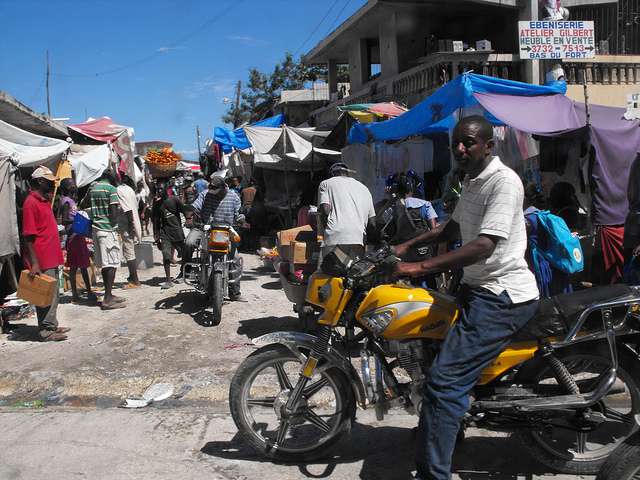
Similarly, Chery critiques “supposedly leftist governments like those of Ecuador, Argentina, Bolivia, Uruguay and Venezuela, [which] have also eagerly supported the [Martelly] regime under the pretext that they would not wish to abandon Haiti to the U.S.” She should have noted, however, that Venezuela, for one, never joined MINUSTAH. Furthermore, officials from both the governments of the late Hugo Chavez and Nicolas Maduro have always defended their dealings with Martelly by saying that they would honor Venezuela’s commitments to the Haitian people — made under President René Préval — whether they liked Haiti’s political representatives or not, a principled approach with contrasts sharply with that of Washington.
There are quite a few detours in We Have Dared to be Free. Chery goes into great depth on the 2010 coup d’état attempt in Ecuador, on how a warming planet causes stronger storms and what damage they have caused worldwide, and on the history and tactics of Martin Luther King, Jr.
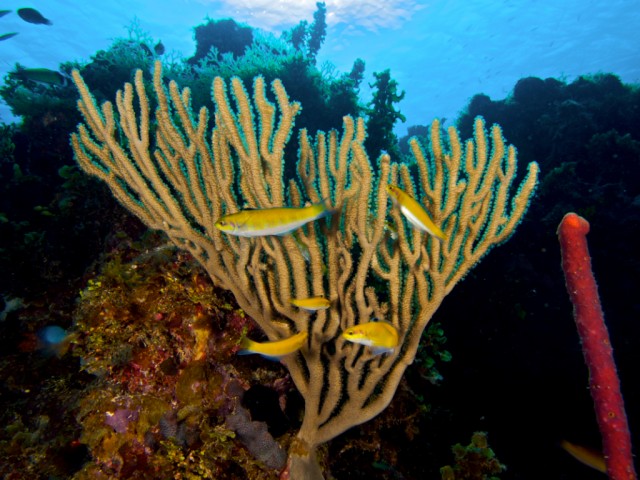
But all these detours lead back to her often revisited central thesis: “The systematic destruction of Haiti, if it is allowed to continue, will not be Haiti’s loss alone. Gone will be a cheerful and sustainable way of life, the taste for being sated with enough, which we must all learn to recover for the sake of our species’ survival.”
As Chery also notes in her introduction: “If Haiti is a model of the world’s depredations, it is also a testament to human resistance.”
Haiti’s 2010 earthquake awakened the engaged journalist lying dormant in a biology professor simply pursuing her career. We Have Dared to be Free is the result: a passionate and scientific argument for how Haiti still offers humanity an example to be followed.
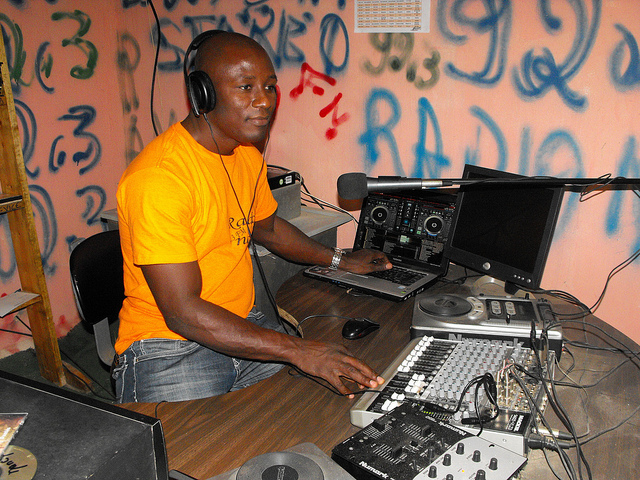
Interviews of Dady Chery with Kim Ives and Roger Leduc, WBAI 99.5 FM
Haitian history and culture: an excerpt.
Kim Ives. This is really a manifesto.
Dady Chery. We need to take it up a notch. We are always embattled, always defending ourselves. Our revolution was one of the most audacious things in human history… To liberate ourselves, emancipate ourselves from slavery. You cannot think after this, that you can just go on, live a quiet life on the farm and be left alone. This is not going to happen…. We need to go on the offensive. We need to say that we’re going to lead a new revolution now… having to do with the way people will live with climate change, about developing a sense of enough so that we can continue to enjoy this planet that we have…. When we fought this revolution, the enlightenment thinkers, they were looking around, and there were slaves around, and this did not bother them. We are the ones who raised the idea of the rights of men to something that could not possibly include slavery.
Kim Ives. Who made liberté, egalité, fraternité a real thing.
Dady Chery. Liberté, egalité, fraternité. We decided that meant us too.
Roger Leduc. That meant everybody. Men really meant mankind, not just white men: everyone. It meant, black, white, male, female and all other genders.
Dady Chery. We were for real. We are the ones who raised the level of that discussion. We changed the maps of South America and North America, because Pétion helped Bolivar…. Before that, when Napoléon lost Haiti, because Haiti was so incredibly valuable to France, he gave up the Louisiana Territories…. So we changed the map of the world. We need to change the attitude of the world. We need to get people to understand the idea that you can have a colorful, happy, wonderful life that doesn’t require completely poisoning the world for everybody else.
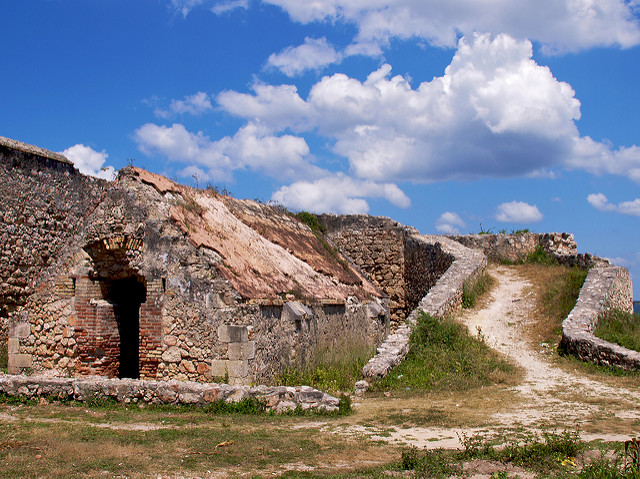
Haiti’s annulled presidential elections, the cholera epidemic, and the Clintons’ legal problems: an excerpt.
Kim Ives. You are a college biology professor here in the United States. One of the themes in the book is about vaccinating against cholera. Can you summarize for our listeners your problems with this vaccination campaign, which is being promoted by the World Health Organization, for one?
Dady Chery. Vaccines are an amazing opportunity to administer drugs to perfectly healthy people. Normally you give drugs to people who are sick. In the case of vaccinations, you are taking perfectly healthy people and giving them something that might actually harm them. Now, there is the notion of primum no nocere: first do no harm. This is part of the Hippocratic oath. You are not supposed to harm people, if you are a doctor and you are trying to help them. Okay. So that’s number one.
The other thing is that we must make a distinction between vaccinations and field trials…. I believe, for example, that the “vaccinations” that took place in Haiti in 2012 were in fact field trials, and I stopped them for quite a while, because when you are… taking a bunch of people and you’re going to test medications on them, there are certain things you need to do. There’s something called the Declaration of Helsinki, and this requires informed consent. You are supposed to tell people what kinds of benefits they’re going to get; they are supposed to make the decision as to whether or not they want to participate. You are supposed to tell them if there are going to be side effects; you’re supposed to tell them what your sources of funding are: whether there are conflicts of interest and who that might involve. Also, pregnant women should be excluded, and it shouldn’t just be by inspection; you should actually do pregnancy tests and exclude women who are pregnant. The side effects should be recorded if there are any, and there should be absolutely no coercion. These kinds of things… have been neglected in Bangladesh, and they were neglected in India, and again neglected in Haiti. I have some serious issues with that.
Another issue I have fundamentally with the idea of vaccination against cholera is that cholera is not really a contagious disease that you can get by casual contact. It is a disease you get when you drink water or you eat food that’s contaminated with cholera. So this vaccination is not meant to protect the general population. What it’s meant to do, which I think is really horrible, it to allow poor people to drink filthy water…. There’s something fundamentally immoral about this.
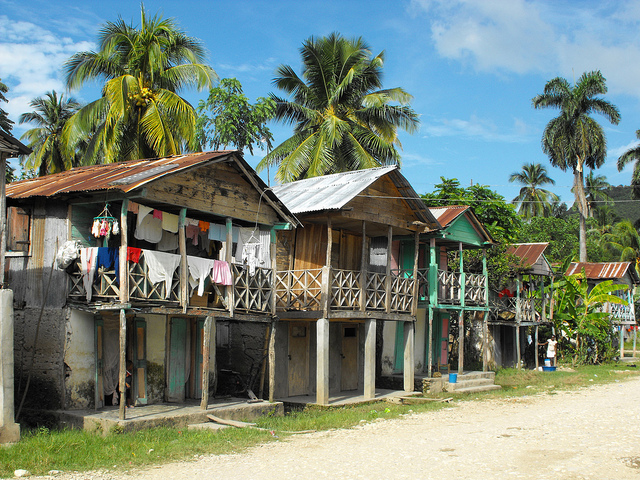
Sources: Haiti Liberté | Photographs one, three, five, six, eight, ten, and twelve by Thomas Hackl; photographs two, four, seven, nine, and eleven by Nick Hobgood.

